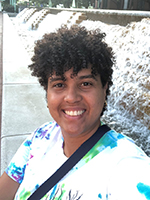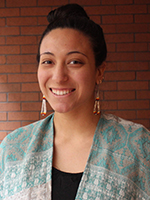Participants: |
|
 |
Ismary Blanco Ismary Blanco is currently a 4th year Ph.D. student in the interdisciplinary program in neuroscience at Georgetown University (GU). At GU, Ismary’s advisor is Dr. Katherine Conant, an expert in metalloproteinases. Ismary’s research focuses on studying how the secretase matrix metalloproteinase-9 (MMP-9) regulates neuronal population dynamics in the telencephalon of the zebrafish using local field potential recordings. Specifically, she is interested in deciphering the role of impaired MMP-9 activity in the onset and progression of depressive-like symptoms in the zebrafish. She earned her BA in Biology from Bard College and her MS in Biology from New York University. A fun fact is that she enjoys drawing Walt Disney characters. |
 |
James Brown My research uses transgenic tools to molecularly dissect the oxytocin system and better understand behavioral preference and social reward from a developmental perspective. The current project examines the genetic contribution of the oxytocin receptor on affiliation and social vigilance in development. The animals I work with are age post-natal day forty-one (P41). This developmental time in mice is closely associated with human adolescence. Adolescence is extremely plastic in mammals because of the rapidly changing and relatively unstable internal and external contexts. Adolescent interactions are rarely aggressive and don’t involve mating. Thus, this time period may be ideal to better understand the underlying approach-avoidance dilemma for sociability, uncontaminated by sexual or aggressive motivations. I plan to become a tenure-track faculty member at a research university. I hope to extend my skill set to include molecular and cellular approaches to understanding the social environment and genetic contributions to long-term behavior and environmental effects. I plan to continue in research, answering questions regarding affiliation throughout development and adulthood, focusing on sex differences. |
 |
Adriana Cushnie Adriana Cushnie is a doctoral candidate in the Graduate Program in Neuroscience at the University of Minnesota. Adriana earned her bachelor’s degree in Psychology at the City University of New York at Brooklyn College. Under the current mentorship of Dr. Sarah Heilbronner, Adriana’s doctoral work focuses on the implementing designer receptors exclusively activated by designer drugs and combining this with whole brain resting state functional connectivity to study large-scale brain networks. Specifically, Adriana plans to apply these methods to study the Salience Network. The Salience Network is a large- scale functional network that plays a role in the detection of salient cues. Altered functional and anatomical connectivity of the SN has been implicated in numerous psychiatric disorders. Adriana plans to pursue a research track career with a continued focus on combing causal manipulations with neuroimaging techniques to study mechanism implicated in neuropsychiatric disorders. |
 |
Jacqueline Garcia I am originally from Pagosa Springs Colorado and graduated from Worcester Polytechnic Institute in 2019 with a degree in Biology and Biotechnology. I joined the Dulla lab at Tufts in May of 2020 and aim to focus on how injury-induced changes in astrocytes, which help control neuronal activity and communication, contribute to the cellular and circuit-level changes that lead to Post Traumatic Epilepsy (PTE). To address this question, I will use cutting edge glutamate and voltage imaging in the brain to determine how injury contributes to the progression of PTE. When completed, I will have novel insight into how glutamate dynamics are altered following TBI, as well as the mechanisms that contribute to these changes. Outside of the lab I enjoy watching basketball, exploring historic Boston, listening to music, and drinking lots of coffee. |
 |
Brianna George Brianna is currently a doctoral candidate pursuing a PhD in Neuroscience at Wake Forest School of Medicine. She earned her Bachelor’s degree in Psychology from Texas Tech University. As an undergraduate, Brianna worked in the lab of Dr. Paul Soto to investigate the long-term effects of adolescent exposure to antipsychotic medication on behavior, cognition, weight, and metabolic function. Her current doctoral work, under the mentorship of Dr. Sara Jones, focuses on identifying alterations in dopamine system functioning that may underlie vulnerability to opioid abuse. Her long-term goal is to obtain a tenure-track faculty position at a research-intensive university. She is looking to participating in this program in hopes to become a better mentor and advocate for increased diversity and inclusion in neuroscience. |
 |
Cera Hassinan Originally from Tempe, AZ, Cera is a member of the Crow Creek Sioux tribe with her maternal family originating from South Dakota and her paternal family based in Cairo, Egypt. In the future, Hassinan wants to build upon her familiy’s legacy and help Native communities by becoming a Native American researcher. Cera graduated from Johns Hopkins University with a bachelor’s degree in Neuroscience. Following graduation, Cera was an NIH-funded post-baccalaureate research education program scholar at the Johns Hopkins School of Medicine, where her research focused on Neurofilament, a cytoskeletal protein, in the context of spinal muscular atrophy in Charlotte Sumner's lab. Cera joined Jihong Bai's lab in 2020 and is a graduate student in the Molecular and Cellular Biology program at the University of Washington. Her research centers on neurodevelopmental mechanisms important for locomotor rhythmic behavior such as running. Toddlers run, but their running patterns are very distinct from those of adults. Cera wants to understand the connections between developmental pathways and the neuronal circuitry critical in producing smooth rhythmic output. She is using a nematode C. elegans to elucidate how rhythmic circuits are established, regulated, and maintained throughout development. |
 |
Taylor McCorkle Taylor McCorkle, MS, is a rising 4th year neuroscience PhD student studying traumatic brain injuries in the lab of Dr. Ramesh Raghupathi at Drexel University College of Medicine. She is originally from Pittsburgh, PA, and prior to graduate school, she received her BA in biology from the University of Pennsylvania in Philadelphia, PA. For her research, she uses an adolescent rat model of repetitive sports-related concussion to determine sex differences in behavioral outcome post-injury. Her thesis work focuses solely on post-injury impairments and sex differences in hippocampal-based cognition, and she has suggested a novel mechanism through which these deficits occur. The mechanism involves corticotrophin-releasing factor serving as a neuromodulator of acetylcholine within the medial septum, ultimately leading to decreased synthesis/release of acetylcholine in the hippocampus. There are currently no FDA approved pharmacological treatments for cognitive deficits following traumatic brain injury, therefore, she hopes her research can serve as a steppingstone in the advancement of the field. |
 |
Katherine Meckel Katherine Meckel is a doctoral candidate in Neuroscience at the Icahn School of Medicine at Mount Sinai. She earned a B.A. in Biochemistry and a B.M. in Voice Performance from Lawrence University, both summa cum laude. There she performed behavioral pharmacology and electrophysiology research under Dr. Bruce Hetzler. She next joined the University of Chicago, working with Drs. Joel Pekow and Marc Bissonnette in the Section of Gastroenterology, where she developed an interest in understanding how peripheral factors such as dietary metabolites modulate brain function. Now in the lab of Dr. Drew Kiraly, she examines the effects of the gut microbiome and its metabolites on cocaine-seeking behaviors. For her efforts, she has been honored with an Excellence in Teaching Award, the Philip Hausfeld Memorial Scholarship Award, a Society for Neuroscience Trainee Professional Development Award, and an NIH Blueprint D-SPAN F99/K00 Fellowship. Beyond the bench, Katherine is the co-founder of the student disabilities group (DREAMS) and serves as a student representative on the Graduate School Steering Committee. She volunteers with Mentoring in Neuroscience Discovery at Sinai, Music and Medicine Concerts, and previously with the Sinai COVID-19 Biobank Team. In the long-term, Katherine hopes to establish her own research laboratory where she will interrogate brain-gut interactions underlying substance use disorders. |
 |
Samantha Montoya Samantha (Sam) A. Montoya is a fourth-year student in the Neuroscience Graduate Program at the University of Minnesota, supervised by Dr. Michael-Paul Schallmo and Dr. Stephen Engel. Sam studies visual perception, with a particular interest in populations who experience altered visual perception. Sam is using a combination of behavioral (psychophysics and surveys/interviews) and neuroimaging (functional magnetic resonance imaging, magnetic resonance spectroscopy, and electroencephalography) to study visual perception and processing in populations with altered visual perception. This includes psychosis spectrum disorders as well as Visual Snow Syndrome—a condition characterized by the persistent experience of flickering specks covering the entire visual field. Sam founded the Twin Cities Visual Snow Society in 2022 to build connections, share resources, and spread awareness about Visual Snow. In addition to her research, Sam uses art to communicate scientific findings with the community and advocate for people with visual disabilities. Sam received her B.A. in Neuroscience and Studio Art from Kenyon College in 2019. |
 |
Desmond Warren Desmond Warren is a Clinical Neuropsychology Ph.D. student at Georgia State University. He earned his M.A. in Clinical Psychology in 2018 at Governors State University in University Park, IL. Currently, he serves as the Equity & Inclusion Officer of the Association of Neuropsychology Students & Trainees (ANST) - APA Division 40, and a Delegate of the Cultural Neuropsychology Council (CNC). Much of his focus deals with brain health and health disparities amongst Black, Indigenous, and People of Color. He's interested in how adverse experiences intersect with race-related neuropsychological outcomes, to better comprehend how diversity of social experiences relates to paths of recovery. His clinical and research interests include cognitive aging, cognitive interventions (e.g., exercise), neuroimaging, neuromodulation, neuropsychological assessments, neuropsychological rehabilitation, and traumatic brain injuries (TBI). As a future clinical neuropsychologist, Desmond wants to clinically treat patients with neurologic conditions in an academic medical center and ultimately start his own private practice. |